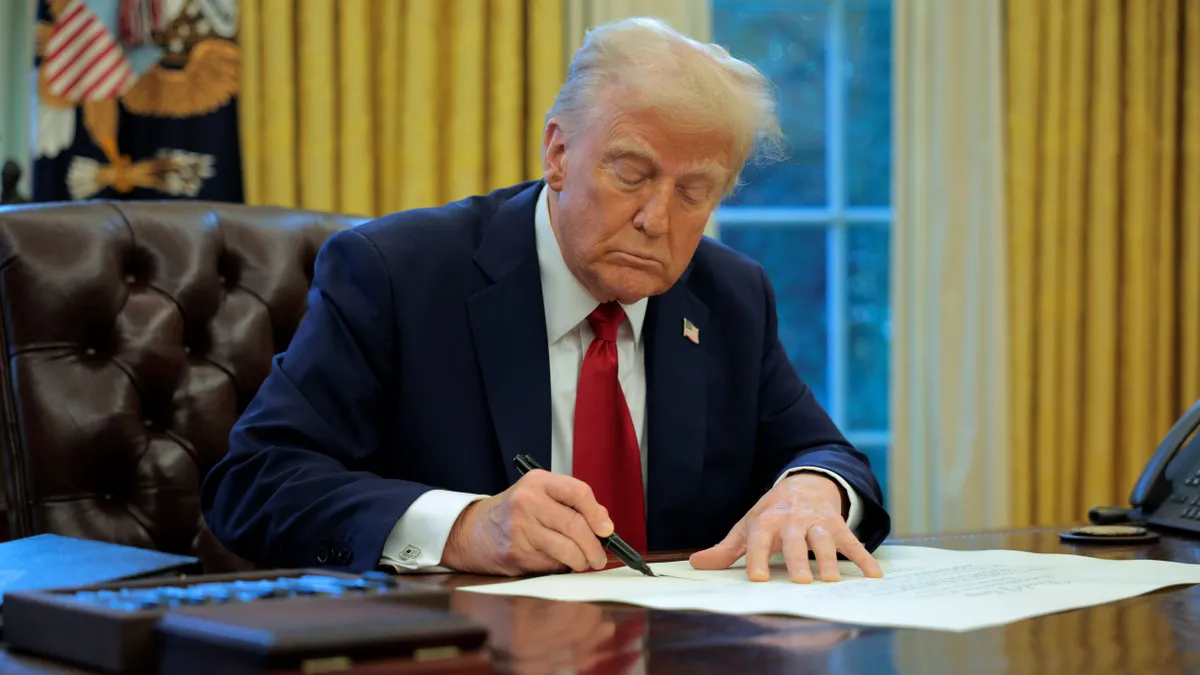Dive Brief:
- A federal judge issued a Feb. 21 decision placing a preliminary injunction on components of two White House executive orders targeting public- and private-sector diversity, equity and inclusion programs — including one order directing federal agencies to encourage private-sector employers to end DEI programs.
- Plaintiffs in National Association of Diversity Officers in Higher Education v. Trump alleged that provisions from the two orders, one issued Jan. 20 and another on Jan. 21, violated the First and Fifth Amendments as well as the separation of powers clause of the U.S. Constitution.
- Judge Adam Abelson of the U.S. District Court for the District of Maryland held that the plaintiffs were likely to succeed on their First and Fifth Amendment claims and granted an injunction on those grounds without reaching the separation of powers claims. Abelson did not block the U.S. Department of Justice from preparing a report on private-sector DEI programs or engaging in investigation of the topic, but his injunction does block application of the orders’ challenged components “to Plaintiffs or to others.”
Dive Insight:
Abelson’s decision deals a blow to President Donald Trump’s multi-pronged effort to dismantle Biden-era DEI initiatives during the first weeks of his administration. It may represent a temporary pause, however, depending on the outcome of any future appeals by the federal government, Eric Meyer, partner at Pierson Ferdinand, wrote in a blog post.
The group of plaintiffs, which included the National Association of Diversity Officers in Higher Education, the American Association of University Professors, Restaurant Opportunities Centers United and the mayor and city council of Baltimore, Maryland, specifically alleged that the private-sector enforcement provision of Trump’s Jan. 21 order was unconstitutionally vague and unlawfully threatened enforcement actions against them for engaging in protected speech.
Abelson sided with the plaintiffs on both counts, holding that the Jan. 21 order focused on deterring DEI principles and programs that constitute illegal discrimination or preferences without a similar restriction on anti-DEI principles that could violate federal antidiscrimination laws. “That is textbook viewpoint-based discrimination,” Abelson said.
The judge also found that neither of the challenged orders provided guidance on which DEI principles and programs constituted illegal discrimination and preferences. Because the Fifth Amendment guarantee of due process requires that such prohibitions be clearly defined, the enforcement threat provision is “facially unconstitutional,” Abelson added.
Attorney General Pam Bondi previously set a March 1, 2025, deadline by which the Justice Department must submit a report containing recommendations for encouraging the private sector to end DEI programs.
Abelson’s decision also enjoined provisions of the two executive orders that directed federal agencies to terminate “equity-related” grants or contracts and required every contractor or grant recipient to certify that they do not operate DEI programs which violate federal anti-discrimination laws.













